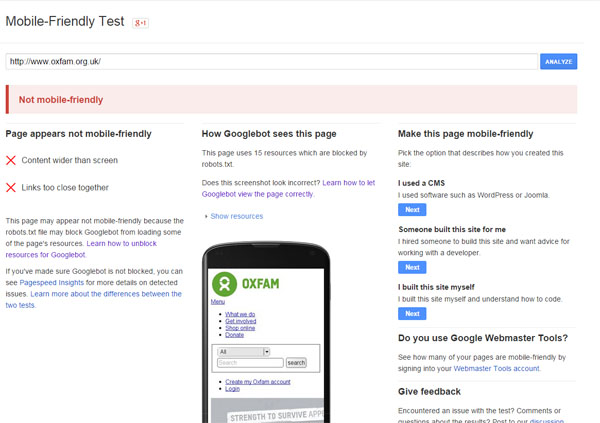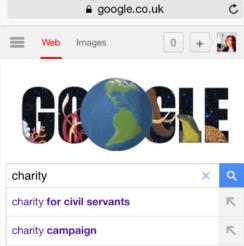One in three top charities’ websites, including Oxfam, the Royal British Legion and British Red Cross, will fall down search rankings after failing Google's new 'mobile-friendly' test.
Yesterday Google started rolling out changes which will mean that websites deemed to meet its mobile-friendly test will be tagged as such and appear more prominently in search results. Criteria for mobile friendliness includes text size, the amount of space between links and whether content fits across a mobile screen.
In a blog Google said the changes would have a “significant impact” on its search results. It has developed a mobile-friendly test tool to enable people to test sites.
Civil Society News used this tool to test the websites for the top 100 fundraising charities listed in this year’s Fundraising Directors Survey, and discovered that 33 out of 100 were not deemed mobile-friendly.
In some cases this may be because the site blocks access to Googlebot, the search engine’s web-crawling bot (sometimes known as a spider) which discovers new and updated pages to be added to Google’s index. This means that there might be a mobile version of the site, but Google cannot find it.
All sites which failed Google’s test (listed below) were then checked using an iPhone. Five (British Red Cross, Oxfam, Unicef, United Jewish Israel Appeal and ABF The Soldiers’ Charity) appeared to have either a mobile site or a responsive website. Google has published instructions on allowing the Googlebot access so that the site can be labelled ‘mobile-friendly’.
Charities are not alone. The BBC and the European Union homepages also fail Google’s test.
Online donations still make up a relatively small proportion of overall giving for most charities, Blackbaud’s latest State of the Not-for-Profit Industry report found that an average of 15 per cent of private giving was done online.

Charities working to upgrade their sites
This morning ten charities told Civil Society News that they are currently working to make their sites mobile-friendly.
Sarah Jordan, head of digital at the MS Society, said: “People with MS are at the heart of everything we do, which is why we consciously strive to make our site as accessible as possible for everyone. Our website plays an important role in providing people with high-quality information on MS, raising awareness of our services, encouraging online donations, and engaging with the MS community through fundraising activities, such as Cake Break, and campaigns.
“We are continually working to improve our site, particularly key journeys where we know people visit our site on their phones. We are also working hard to ensure that any new microsites we develop are mobile responsive.
“This is an exciting time for the charity, as we embark on a new digital vision. Over the next year we will be undertaking a full redevelopment of our website which will see a step change in our digital presence and help us to further improve the experience of mobile and other users.”
Claire Reynolds, head of digital at Parkinson’s UK, said that developing a new mobile-friendly site was “already in the budget for this year so this change just makes it even more important that we prioritise this piece of work”.
She added that: “We will be monitoring the situation over the course of the next few weeks but there is no quick fix.”
WaterAid said that some of its site was already optimised for mobile devices and the rest would be once a new site is launched at the beginning of July. Chris Wainwright, head of communications, said: “Several areas of the WaterAid website are already mobile optimised, including all donation forms, with Google’s changes due to be addressed by the launch of our fully adaptive mobile site at the beginning of July. We are excited that this will provide a better user experience for all of our supporters.”
Action for Children, Cystic Fibrosis Trust, Scottish SPCA, National Theatre, and the National Trust also said that they were already in the process of developing new websites that would be mobile- friendly.
Eddy Lambert, web and mobile channel manager at Oxfam, said: ""Oxfam GB is aware of the changes Google has made, our online shop at is fully mobile optimised and its search position will not be affected by the changes.
"The main Oxfam corporate website and fundraising channels are already largely optimised for mobile and tablet but do not quite meet Google's stringent requirements at present. The necessary changes to meet the new standards have been in testing for the last few weeks and will be live by the middle of May."
Alison Prince, head of digital at Alzheimer’s Society said: "We are aware of this change by Google and are already working on measures to improve mobile experience on Alzheimer’s Society websites. People affected by dementia are at the heart of all our work and we involve them wherever possible in the planning and testing stages of our digital products and services."
Charities affected by changes:
- British Red Cross Society
- Oxfam UK
- Royal British Legion
- Unicef
- Guide Dogs
- PDSA
- National Trust
- Christian Aid
- Barnardo's
- WaterAid
- Alzheimer's Society
- Cafod
- The Prince's Trust
- Westminster Roman Catholic Diocesan Trust
- Parkinson's UK
- MS Society
- Arthritis Research UK
- National Deaf Children's Society
- Blind Veterans UK
- Action for Children
- Stroke Association
- Royal National Theatre
- Scottish SPCA
- Children with Cancer
- Bible Society
- Sense
- Royal Star & Garter Homes
- United Jewish Israel Appeal
- Mencap
- Roman Catholic Diocese of Shrewsbury
- Cystic Fibrosis Trust
- Erskine Hospital
- ABF The Soldiers' Charity









